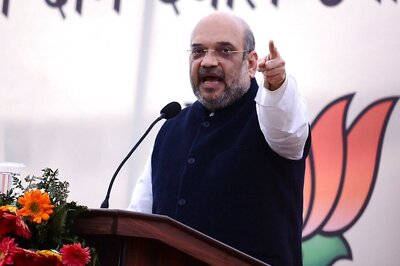
views
The telecom industry's lobbying muscle pushed a consumer privacy measure to a swift death in Congress.
Republicans struck down Obama-era rules that would have imposed tight restrictions on what broadband companies such as Verizon, AT&T and Comcast could do with their customers' personal data. Digital-rights and consumer-advocacy groups such as the Electronic Frontier Foundation supported keeping the rules. But they were outmatched by telecom trade groups and lobbyists.
"These guys spend a fortune in D.C., they're very plugged in on the Hill and this was clearly their priority," said Craig Aaron, the president of consumer-advocacy group Free Press.
Former AT&T lobbyist Steve Billet, now on the faculty at George Washington University, said the telecom industry's willingness to spend big on lobbying marks "the difference between them and the Electronic Frontier Foundation guys."
ROLLING IN THE CASH
The overall lobbying tab for telecom services and telephone companies exceeded $123 million in 2016, the money-influence research group Center for Responsive Politics says. That makes them among the top-spending industries in Washington. By contrast, some of the most active privacy and consumer groups on the other side spent just over $1 million, according to the nonpartisan group's data.
The lobbying on both sides goes far beyond privacy. Other issues on the agenda included immigration, taxes, cable boxes and cybersecurity. But the disparity in the spending totals shows that when it comes to politics, industry can wield a lot of power with its pocketbook.
Telecom has also given more in political contributions to the House Republicans who voted to repeal the rules (about $138,000 on average over their careers) than to the 15 Republicans who voted to keep them ($77,000), according to the Center for Responsive Politics. In the Senate, the Republicans who voted to undo broadband privacy received more from telecom ($369,000) than the Democrats who voted to keep the rules ($329,000).
Rep. Marsha Blackburn, R-Tenn., who heads the House subcommittee on communications and technology, received more than $125,000 from telecom for the 2016 elections, while the ranking Democrat, Mike Doyle of Pennsylvania, got about $88,000.
In the Senate, Jeff Flake, R.-Ariz., chairman of a privacy and technology subcommittee, received some $59,000, compared with nearly $27,000 for the ranking Democrat, Al Franken of Minnesota.
To be sure, money does not guarantee a favorable vote. Rep. Steny Hoyer of Maryland, the second-highest ranking Democrat in the House, received more than $1.3 million from telecom over his career and nearly $190,000 for the 2016 election. Yet he joined every other voting Democrat in opposing the industry's repeal efforts.
GETTING HEARD
The repealed rules would have required companies to get customers' permission before offering marketers a wealth of information about them, including health and financial details, geographic location and lists of websites visited and apps used.
Republicans and industry officials complained that the restrictions would have unfairly burdened internet providers, as advertising rivals such as Google and Facebook don't have to abide by them.
The rules had been scheduled to take effect later this year. Congress used an obscure 20-year-old law to scrap this and numerous other regulations that Republicans consider costly, burdensome or excessive. President Donald Trump signed the privacy repeal into law early this month.
Although this repeal came as part of a broader deregulatory rush, the money that large corporations and their employees are able to spend on lobbyists and give to lawmakers helps get such issues on the agenda.
Individuals concerned about privacy would probably chat with an intern or low-level aide; corporate executives giving a lot of money would have lawmakers' ears at fundraising events, if not on Capitol Hill. Same goes for lobbyists for those companies.
"It's the classic story where the side with more money has more influence here," said Dallas Harris, a policy fellow at Public Knowledge, which organized a campaign against the privacy repeal.
Comcast and Verizon did not respond to emailed questions. AT&T, when asked about lobbying's role in the repeal, pointed to a blog post saying its privacy protections have not changed. The cable trade group NCTA said it doesn't comment on specifics of lobbying.
A BIGGER FIGHT
Internet service providers and the rest of the telecom industry also had help. Groups representing the online advertising and broader consumer technology industries also wanted the rules gone. Google itself criticized them before the Federal Communications Commission approved them last year. This wasn't the net neutrality fight of 2014, when telecoms squared off against tech companies.
"I don't know that the ISPs themselves could have gotten the attention this issue got," said Bennett Ross, a telecom lawyer at Wiley Rein, which has a large telecom industry practice that's home to many former government staffers. "I think it absolutely helped to have a number of different constituencies coming to Congress and saying this is a problem."
Plus, Free Press' Aaron said, "There were no citizens raising their voice saying this was a great idea. The lines were dropped pretty clearly here and Congress went with the companies. This was one of those instances that there wasn't an industry counterweight."
Expect fiercer lobbying - and more spending - as Republicans target a repeal of net neutrality rules, which prohibit ISPs from favoring their services over rivals. That battle is being waged at the FCC's offices as well as Congress.




















Comments
0 comment